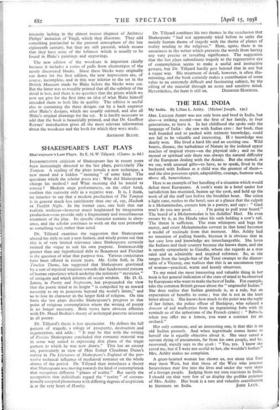THE 'REAL INDIA
My India. By Lillian L. Ashby. (Michael Joseph. Iss.) Mits. LILLIAN ASHBY was not only born and bred in India, but also—a striking record—was the first of her family, in four generations, to leave it. In her childhood she spoke only the language of India : she saw with Indian eyes : her book, thus well founded and so packed with intimate knowledge, could not fail to be valuable and interesting. H :r knowledge was dearly won. She lived a hard life and an exciting one. Wild beasts, disease, the turbulence of Nature in the isolated upper reaches of tropical rivers—on the physical side ; and on the mental or spiritual side there was always the natural difficulty of the European dealing with the Asiatic. But she started, as we see, with unusual gifts—to have, so to speak, lived in the backyard with Indians as a child was the greatest of them— and she also possesses spirit, adaptability, courage, humour and, above all, benevolence.
Here is an example of her handling of a situation which would defeat most Europeans. A cook's mate in a hotel under her jurisdiction has mutinied, beaten up the cook, and held up the work of all the staff just before the breakfast hour. She seizes a light cane, rushes to the hotel, sees at a glance that the culprit is a Mohammedan, corners him in a pantry, and says : " Gaol won't do you any good. . . . I'm going to pull your beard." The beard of a Mohammedan is his Achilles' Heel. He even swears by it, as the Hindu takes his oath holding a cow's tail. The threat is sufficient. The man whimpers and begs for mercy, and every Mohammedan servant in that hotel becomes a model of rectitude from that moment. Mrs. Ashby had no intention of pulling beards, because it is obvious that in her case love and knowledge are interchangeable. She loves the Indians and their country because she knows them, and she is openly sympathetic to Gandhi, whom she regards as a true saint and an admirable and inspired reformer. So, as she ranges from the jungle-hut of the Terai swamps to the dinner- table of a Viceroy, one realises that this is an uncommon type of woman—practical, warm and keenly observant.
To my mind the most interesting and valuable thing in her book is her general indication of the state of mind to be observed by Europeans who want to make the best of India. For example, take the common British grouse about the " ungrateful Indian." She does realise that Indian gratitude is, as a rule, but an expectation of benefits to come ; but she is not in the least bitter about it. She knows how much to the point was the reply of her father, the police officer of Bankipur, who refused a douceur of red mulberries from an ingratiating babu with (it reminds us of the aphorisms of the French cynics) : " Babu-ji, when you offer me a lemon, you want a contract for an orchard."
Her only comment, and an interesting one, is that this is an old Indian proverb. And when ingratitude comes home to herself she is equally objective about it. She once cured a servant dying of pneumonia, far from his own people, and he, recovered, merely says to the ayah: " Yes, yes. I know she saved me, but if I were not useful to her, she wouldn't bother." Mrs. Ashby makes no complaint.
A great-hearted woman has shown us, not alone that East may meet West, but that those of the West who practise benevolence may live into the lives and under the very skins of a foreign people. Judging from my own reactions in India, I should say that very few of us display the godlike patience of Mrs. Ashby. Her book is a rare and valuable contribution






































 Previous page
Previous page